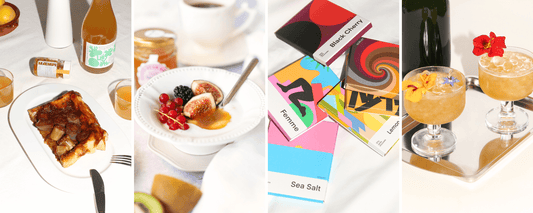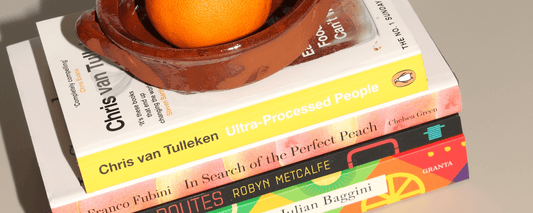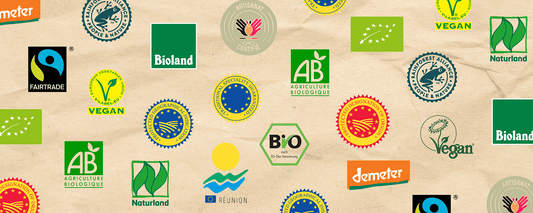Read to Eat Better: Our 4 Favorite Books on Good Food and Nutrition
What we eat shapes how we live — and at Gourmie Goods, we believe that understanding our food is the first step to eating well. Over time, our food system has become increasingly complex, and with that complexity comes a need for clarity. Long before starting Gourmie Goods, we were curious — at times even obsessed — with learning how the food system really works.
Our preferred way of exploring this world? By learning from those who’ve been immersed in it far longer than we have: experienced farmers, food entrepreneurs, scientists, doctors, and professors from some of the world’s top institutions. People who’ve spent decades questioning, studying, experimenting, building — and sharing their knowledge through books, research, and lived practice. Each of them deep in their own niche, each committed to understanding and uncovering the truth about what we eat.

In this article, we share four books that have deeply influenced our philosophy at Gourmie Goods. They’ve shaped not only how we think about quality, sustainability, and the flavour of food — and how we source our products — but have also underscored why we so urgently need a better food system. From food politics to taste, from cultural traditions to global supply chains — each one brings a fresh perspective for anyone who wants to eat better, learn more, and make educated decisions about what’s ending up on their plate.
1. Ultra-Processed People by Chris van Tulleken (2023)

This is the book that pulls back the curtain on the modern food industry. Written by Dr. Chris van Tulleken — an infectious diseases doctor, BBC broadcaster, and researcher at University College London — the book was published in 2023 and quickly became a landmark in public food discourse.
Van Tulleken dives deep into the world of ultra-processed food (UPF) — not just how it’s made, but what it does to our bodies, behaviours, and society. Combining science, personal experiment, and global research, he shows how UPF affects our health, habits, and even our sense of self. It’s part investigation, part personal journey — and entirely relevant to how we eat today. For anyone tired of being misled by “Big Food,” this is the eye-opener. An absolute must-read.
Why we recommend it
Much of what we consider “normal food” is anything but. Van Tulleken explains how UPF reshapes our bodies and brains — and why its rise is no accident. We’ve normalized a food system that prioritizes convenience and profit over health. This book makes you stop and question what’s really in your food — and why that matters. For anyone who wants to eat more consciously, this is essential reading.
2. In Search of the Perfect Peach by Franco Fubini (2024)

This is a love letter to flavour, seasonal food, and the people who grow it with expertise, care, and generational knowledge — all against the pressures of industrial agriculture. Written by Franco Fubini, founder of Natoora — a London-based food sourcing company working with small-scale growers across Europe and North America — the book offers a rare, pioneering approach: it places flavour at the heart of fixing our broken food system.
Published in 2024, In Search of the Perfect Peach is about seasonality, sustainability, and the art of working with the land — not against it. Fubini’s writing brings you closer to the soil, to the people behind the food, and to the forgotten truth that taste begins long before the kitchen.
Why we recommend it
Fubini reminds us that real flavour begins with nature — the soil, the water, the weather — and with the hands of farmers who’ve mastered the delicate balance of working with the earth, not abusing it. This book offers a deep appreciation for the beauty of imperfect, seasonal produce — and features dozens of stories about the growers who make it possible.
It’s a manifesto for anyone who believes that good food starts in the soil. After reading it, you’ll crave your local market’s crooked carrots and sun-warmed peaches. And supermarket produce? You simply won’t be able to look at plastic-wrapped, off-season fruit the same way again.
3. How the World Eats by Julian Baggini (2024)

This is not a cookbook — it’s a cultural investigation. Written by British philosopher and writer Julian Baggini, and published in 2024, this book explores what eating means across the world — from the deeply traditional to the radically modern. Through conversations, observations, and shared meals, Baggini uses food as a lens to ask deeper questions about ethics, identity, and tradition.
It’s thoughtful, philosophical, and refreshingly open-minded — a journey through global food cultures that doesn’t search for the “best” cuisine, but instead examines how values, habits, and beliefs shape what ends up on the plate.
Why we recommend it
From Japan to Ethiopia, Baggini shows how food is shaped by geography, history, and worldview — and what we can learn when we step outside our own cultural defaults. It’s a beautiful reminder that food is culture, and that understanding how others eat can help us better understand ourselves — and the world around us.
4. Food Routes by Robyn Metcalfe (2019)

Ever wondered how a tomato gets from field to fridge? Food Routes, published in 2019, explores the hidden infrastructure that powers the global food system — from cold chains and cargo ships to blockchain and big data.
Written by Robyn Metcalfe, a food historian and researcher at the University of Texas, the book offers a rare look behind the curtain of how food moves — and how fragile, complex, and fascinating that journey really is. It’s a book about logistics, yes — but it reads like a guided tour of the global machine that feeds us.
Why we recommend it
Our food travels further and faster than ever before, often through systems we rarely notice. Metcalfe shows how understanding this invisible infrastructure is essential — not just for making better choices as consumers, but for building a more resilient and equitable food system.
This book reminds us that good food isn’t only about taste or sourcing — it’s also about how food moves, who controls that movement, and what happens when those systems are disrupted. For anyone curious about the distribution side of the food world, this is a must-read.
Conclusion
Each of these books has helped shape how we approach food at Gourmie Goods — from what and how we source products to how we think about quality, sustainability, and taste. They invite us to slow down, ask better questions, and reconnect with what we eat.
They also remind us of the bigger mission we’re on: to make it easier to choose food that’s real, seasonal, and incredibly good — for you, for the planet, and for the people who produce it. All of it stands in quiet resistance to the forces of industrial food production and large-scale agriculture. If you’ve ever wanted to go deeper into where your food comes from — or why it matters — these four reads are a perfect place to start.
Has a book ever changed the way you think about food? We’d love to hear about it — share your recommendation in the comments.
Hungry for more? Explore our guides to reading food labels, seasonal eating, or choosing products from small producers — and take the next step toward eating well.

About author
Baiba Soika
Food writer and Co-founder of Gourmie Goods, Baiba is dedicated to putting good food at the center of modern living, believing food is the foundation of a successful life. With a background in international trade, design, and technology, she brings a unique, multifaceted approach to food industry. When not sourcing products or exploring new brands and trends, you'll find her somewhere near the sea, on the badminton court, doing sudoku, or in the kitchen, crafting simple yet flavorful dishes. Based in Düsseldorf, Germany.





